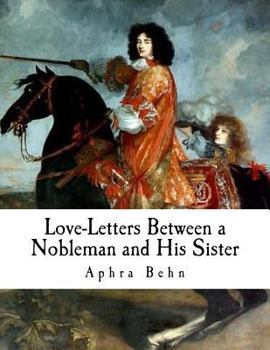Love-Letters Between a Nobleman and His Sister
Select Format
Select Condition 
Book Overview
Love-Letters Between a Nobleman and His Sister by Aphra Behn. Love-Letters Between a Nobleman and His Sister is an anonymously published three-volume roman clef playing with events of the Monmouth Rebellion and exploring the genre of the epistolary novel. It has been attributed to Aphra Behn, but this attribution remains in dispute. The novel is "based loosely on an affair between Ford, Lord Grey of Werke, and his wife's sister, Lady Henrietta Berkeley, a scandal that broke in London in 1682." It was originally published as three separate volumes: Love-Letters Between a Noble-Man and his Sister (1684), Love-Letters from a Noble Man to his Sister: Mixt with the History of Their Adventures. The Second Part by the Same Hand (1685), and The Amours of Philander and Silvia (1687). The copyright holder was Joseph Hindmarsh, later joined by Jacob Tonson. In the time of the rebellion of the true Protestant Huguenot in Paris, under the conduct of the Prince of Cond (whom we will call Cesario) many illustrious persons were drawn into the association, amongst which there was one, whose quality and fortune (joined with his youth and beauty) rendered him more elevated in the esteem of the gay part of the world than most of that age. In his tender years (unhappily enough) he chanced to fall in love with a lady, whom we will call Myrtilla, who had charms enough to engage any heart; she had all the advantages of youth and nature; a shape excellent; a most agreeable stature, not too tall, and far from low, delicately proportioned; her face a little inclined round, soft, smooth and white; her eyes were blue, a little languishing, and full of love and wit; a mouth curiously made, dimpled, and full of sweetness; lips round, soft, plump and red; white teeth, firm and even; her nose a little Roman, and which gave a noble grace to her lovely face, her hair light brown; a neck and bosom delicately turned, white and rising; her arms and hands exactly shaped; to this a vivacity of youth engaging; a wit quick and flowing; a humour gay, and an air irresistibly charming; and nothing was wanting to complete the joys of the young Philander, (so we call our amorous hero) but Myrtilla's heart, which the illustrious Cesario had before possessed; however, consulting her honour and her interest, and knowing all the arts as women do to feign a tenderness; she yields to marry him: while Philander, who scorned to owe his happiness to the commands of parents, or to chaffer for a beauty, with her consent steals her away, and marries her.
Format:Paperback
Language:English
ISBN:1979776563
ISBN13:9781979776561
Release Date:November 2017
Publisher:Createspace Independent Publishing Platform
Length:208 Pages
Weight:1.25 lbs.
Dimensions:0.4" x 8.5" x 11.0"
Customer Reviews
1 rating
sexuality and desire
Published by Thriftbooks.com User , 25 years ago
Aphra Behn's Love Letters Between a Nobleman and His Sister reveals the progress of the consciousness of the once innocent and naive Sylvia, who, after being seduced into an affair with her brother-in-law, Philander, learns of her own sexuality and desires. Behn's novel is not only an exploration of the sexual politics of the socety in which she lived in, but also, an examination of the notions of gender and identity. The exchange of love letters between Sylvia and Philander allows readers to sense the intimacy between the two couple, but most importanly, it allows readers to follow the transformantion of Sylvia's identity from lady to whore. Behn conveys the double standard that exists in her society, and perhaps our society as well. Philander, after his lover affair and scandal is still a lord, but unfortunately for Sylvia, once 'undone' is no longer a lady. This book was useful in helping me understand the sexual politics of seventeenth-century English society.






